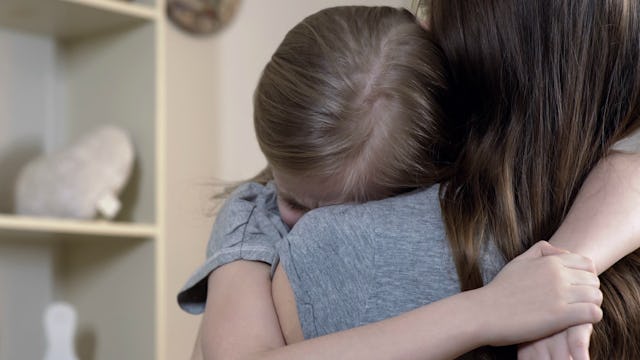This Is The Reality Of Parenting A Child With Mental Illness

It’s been four years.
Four entire years of holding our collective breath, of quietly celebrating small moments of success, of surprised quick and genuine laughter at unexpected times. Four entire years of attempting to understand how to love, comfort, work with, teach, help, and tolerate a child with a mental illness.
M is closer to seven than six now, and every day is a brand new opportunity, a brand new battle, a brand new positive, or a brand new heartbreak. Some days are every single one of those descriptors over just a few dizzying hours.
Earlier this week she picked a purple flower off our not yet mowed lawn.
Sarah Burtchell
Her treasure had a bizarre shape to it, bent over at the top so that the petals pointed sideways away from the sun. That in itself made little sense to me — turning away from the very thing giving the ability to live. It also reminded me of a strange umbrella from a fantasy movie.
In a somewhat rare moment of relaxed playfulness, I put my hand out — and, in a matching moment of unusual compliance, she just gave it to me. And then I held it over her head and said something goofy about it protecting us from the rainstorm.
It was lighthearted and sweet and so stunningly typical. It was the kind of thing that happens with children all over the world every single day. Just a moment of smiles and ease and pretend.
It was the kind of moment that doesn’t happen every day with children who have mental illnesses like post-traumatic stress disorder and reactive attachment disorder. The neurological changes that accompany these disorders create behavior that is shocking to most.
Those kinds of moments, easy moments of smiles and sunshine, are the types that kids with these problems are much less likely to be able to access. Experiencing true relaxation is nearly impossible when maladaptive levels of cortisol course through your brain at nearly every moment of the day.
Today, M came home from a rough seven hours at school, already amped. She’d been in the seclusion room for unsafe behavior at least once, and she was agitated and irritable, and in that state where she is looking for someone to argue with, for someone to control — for something, almost anything, to fight over.
We still managed to kick a ball back and forth in the sunshine for a few minutes. But after a little while of failed attempts at getting me to argue with her, she looked at me with narrowed eyes, brazenly held that contact, and stepped onto the edge of the road as a car drove by — not close enough to cause damage, but close enough to startle the driver and cause her to pull her car to the side. I told her, in an angrier voice than I wish I had, to go inside and upstairs.
She rages one to four times a day, most days, and usually one to two of those times are in the afternoon. Here, that looks like screaming and kicking walls. At school, it looks like aggression toward staff and destruction of property.
Today, after the car incident, she spent many minutes screaming from behind her bedroom door strings of hurtful adjectives to describe me and the rest of her adoptive family. It’s possible that I’ve never been called that many terrible things for 15 minutes straight before. And yet, I have a feeling this is just the beginning.
It’s sad that she went through what she did before even being able to speak. It’s disturbing that she has a list of diagnoses that many cannot understand and that most certainly cannot sympathize with. It’s heartbreaking that she turns away from so many who are seeking to help, that she attempts to wound them with words and actions, despite needing them desperately.
It’s tragic, starting life that way.
I could really use some version of that strange, purple flower umbrella we played with on that bright, breezy day in the yard. An umbrella flower big and powerful enough to somehow protect us all — that badly hurt little girl and the other four continuously startled people living in this home — from this heart-wrenching, mental illness-fueled storm which grips a 40 pound person so tightly, and whose end may be nowhere near.
This article was originally published on